Related Topics
Benjamin Franklin
A collection of Benjamin Franklin tidbits that relate Philadelphia's revolutionary prelate to his moving around the city, the colonies, and the world.
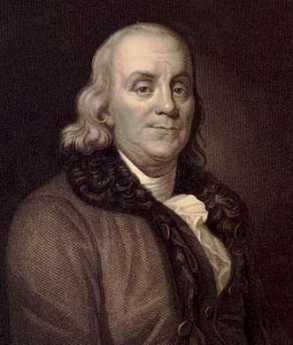
Articles of Confederation
The Articles of Confederation were written by John Dickinson, modified by others. Officially unratified for five years, the country was ruled under them in Philadelphia, for thirteen. They taught many lessons, which we sometimes forget we had experienced.
Connecticut Invades Pennsylvania!
Connecticut once waged three serious wars with Pennsylvania, and we don't even remember it. But politicians noticed that all became peaceful after we united into a single nation. Others noticed the Articles of Confederation were strong enough to cope with invasions by neighbor states. The two proprietorships of New Jersey taught some smaller lessons. Virginia taught still other lessons.
Revolutionary Philadelphia's Loyalists
History is written by the victors, so the Tory Loyalists of Revolutionary Philadelphia have mostly fallen from view.
Causes of the American Revolution
Britain and its colonies had outgrown Eighteenth Century techniques of governance. Unfortunately, both England and America lacked the sophistication to make drastic changes smoothly.
New Jersey (State of)
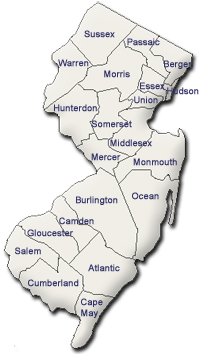 The Garden State really has two different states of mind. The motto is Liberty and Prosperity.
The Garden State really has two different states of mind. The motto is Liberty and Prosperity.
Revisionist Themes
In taking a comprehensive view of a city, an author sometimes makes observations which differ from the common view. Usually with special pride, sometimes a little sullen.
Addressing The Proprietors' Dilemma
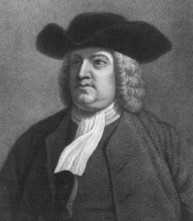
|
| William Penn |
DURING the century which elapsed after Charles II gave away Pennsylvania to William Penn, several hundred thousand people moved in and changed the place. Transformation of the wilderness explains why the terms of the grant seemed logical at one time, but proved almost impossible to manage at the time of the Revolution. The Penns with thirty million acres was the largest landholders in America but, in fact, by 1776 only five million acres had been sold in a century. The land they held was simply too much for one family to handle without an army, and although the original settlers were pacifists, the later ones were combative.
Charles II had written in the Charter that the Penns could have the land if they could maintain order there, retaining the legal right for the King to recover the land if they didn't. This fall-back provision certainly reflects some doubt about the ability of pacifists to shoot the necessary number of Indians, Frenchmen, and Spaniards. On the other hand, the motive for a King delegating away his authority in the first place became clearer when the Penns experienced severe financial strain defending the Northeast corner of the state against the Connecticut invaders. It furthermore helps us understand why Benjamin Franklin received such a cold reception when he was sent to London by the colonists to request the crown to reassert civil authority over the state. That did not necessarily imply stripping the Penns of their land; by this time, it was clear that the Penn Proprietors were mainly interested in selling it to someone. The charter of the King's grant included the offer to make William Penn a King; and although the offer was declined, the Penn Proprietors retained some degree of legal power to govern the territory. Franklin for all his persuasive power was, unfortunately, the one man Thomas Penn didn't want to see, because of the threat he had posed by raising a militia in King George's War, and later his expansiveness at the Albany Conference. And Thomas was a good friend of the King. The King didn't want these problems and particularly didn't want the expense. Ambiguities were, of course, shared all around. William Penn had quite shrewdly seen it was more sensible to treat the Indians decently than to fight with them, and cheaper too; the lesson was not lost on the British crown. But the French Kings posed a much larger world-wide threat to the British colony, finding for their part, it was rather economical to supply munitions to the Indians on the frontier and stir them up emotionally. The French and Indian War was a small component of the Seven Years War, which proved to be a costly adventure for both sides. Its local cost certainly overwhelmed the ability of one family to underwrite local governance in a large wartime colony, and it jeopardized the finances of the British Monarch to carry the rest. The resulting need to tax the colonies for their defense sent things downhill, eventually to the Stamp Act, the Townshend duties, and the Tea Tax. Everyone made lots of mistakes as the whole structure underwent revision, just as pacifists are certain will happen in any war. But when a pacifist utopian colony was prospering while successfully dealing with the Indians, it's all sort of a big pity.
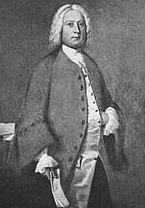
|
| Thomas Penn |
With much to lose, the Penn family did pretty well with the resources at hand. By the time of the Revolution, three generations of Penns had divided up ownership shares of the Proprietorship. When French and Spanish ships were marauding the Delaware River, Benjamin Franklin the local printer took it on himself to organize a militia which persists today as the Pennsylvania National Guard, the Twenty-eighth Division. Franklin was suddenly a local hero to everyone, except to one man, Thomas Penn. Thomas was the dominant figure in the Penn family for many years and worried deeply about Franklin, a man who could stir up ten thousand armed volunteers with a poster proclamation. Such a man could mean trouble, as indeed events later proved to be the case.
John Penn was the Governor of the state, residing in his mansion on the Schuylkill called Lansdowne, doing his best to ingratiate the locals. He struggled to be diplomatic when arguing for the decisions actually made by his Uncle Thomas in London. Thomas Penn, on the other hand, was an important friend of the British Ministry, and a notable person in aristocratic England. As the Revolutionary War approached, the problem transformed into how to hold on to 25 million unsold acres, while remaining unsure who was going to win the impending war.
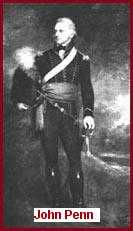
|
| John Penn |
The strategy the Penns adopted was to get out of the business of running a local government, as Franklin had proposed but in a different way. John Penn the Governor became a private citizen, just a local real estate agent. He took an oath of allegiance to the Revolutionary government, which in the chaos of the time was equivalent to becoming an American citizen. Meanwhile, other members of the family remained in England, ready to revise the arrangement if the British won the war. It was all fairly transparent straddling of the issues, which was only even remotely likely to be effective because of the enormous store of Penn goodwill built up over a century. In 1789 revolutionary France, for example, such sentimentality would not have delayed the tumbrels to the guillotine for five minutes.
Meanwhile, an unexpected difficulty was created. By withdrawing from control of the local government, the Penn family also withdrew from the defense of state borders against neighboring colonies. Under the circumstances, the Penns were afraid to appeal to the King, while the new government of Pennsylvania found the Articles of Confederation were merely a wartime tribal compact. The Articles stabilized boundaries mainly for the purpose of conducting a united war, and did not seriously contemplate a continuing judicial role for disputes between colonies. When the Revolution was finally over, the Penn Proprietors were not left with much of a bargaining position. The new State of Pennsylvania offered, and they accepted, about fifteen cents an acre to surrender their claims. In Delaware, they got essentially nothing for those three counties. Only in New Jersey did the Proprietors' claims remain durable after the new nation was established. The Proprietorship of East Jersey survived into the late 20th century, and the Proprietorship of West Jersey continues to return a small profit even today. The New Jersey curiosity is treated in a separate essay.
Originally published: Wednesday, September 27, 2006; most-recently modified: Friday, September 20, 2019
| Posted by: Tim | Apr 19, 2016 10:23 PM |